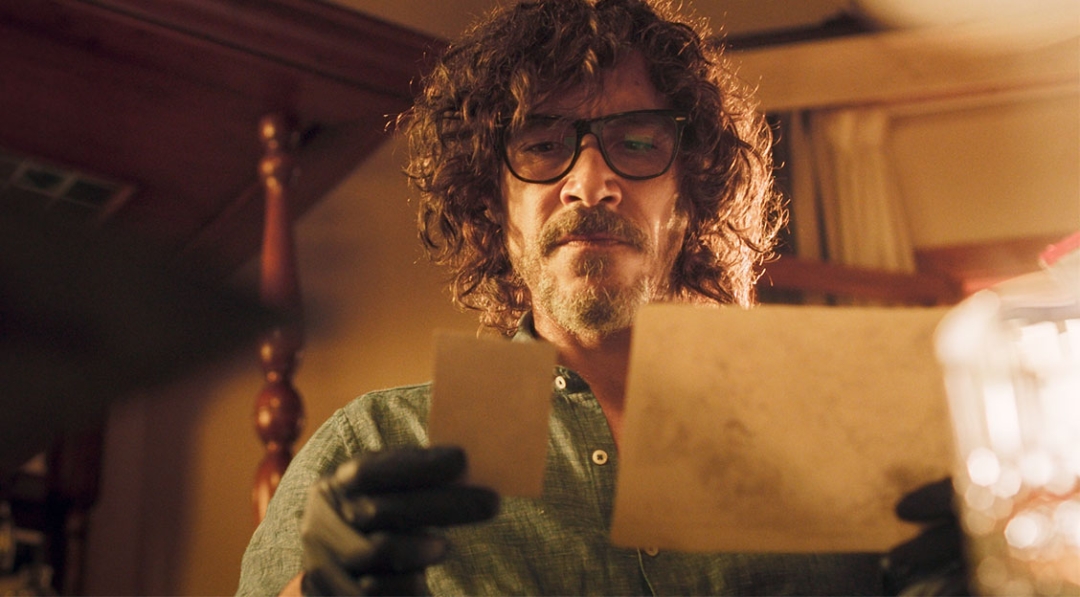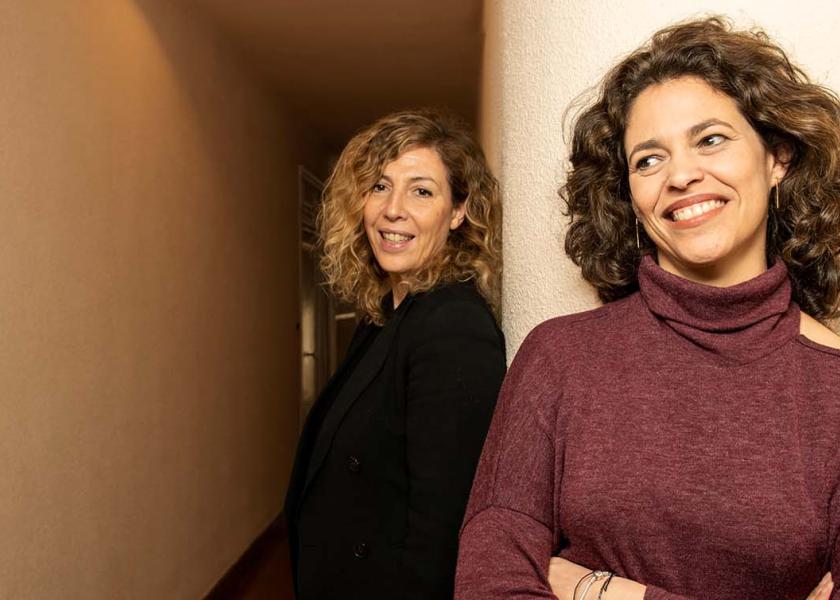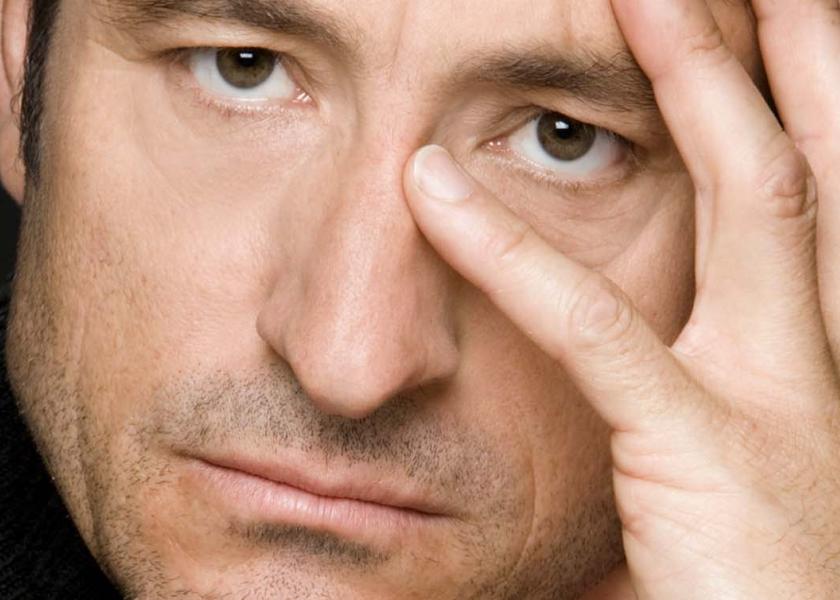Óscar Jaenada
The travelling comedian

Comedians have always been nomadic, travelling from village to village and city to city, making people laugh, cry, and think. Today, Óscar Jaenada honours that legacy, but his stage is the entire world: from the United States to Mexico, from Colombia to Panama, and from Costa Rica to Spain, where 'Skin in Flames' will première in a few weeks. Before that, he’ll be part of the PLATINO Awards gala, which holds a special place in his heart.
In Voyage to Nowhere (Fernando Fernán-Gómez, 1986) the character played by José Sacristán asked himself: “Where’s the comedians’ manna? Which land will it fall on that’s ours, if we don’t belong anywhere? We belong to the road.” This sentence could perfectly define the career of Óscar Jaenada (Esplugues de Llobregat, 1975), an actor who’s toured his art around the world. Precisely for this reason, there are few people better equipped than him to talk about the Ibero-American talent recognised by the PLATINO Awards. But first we ask him about his upcoming film, Skin in Flames (out on the 27th of May).
In Skin in Flames, you play a photojournalist called Frederick Sálomon, what drew you to the character?
I’m a huge fan of photography and I was aware of several stories of photographers who captured pictures that changed their lives. When Guillem Clua [author of Skin in Flames] and David Martín-Porras, the director, showed me the story, I thought of Kevin Carter [winner of the 1993 Pulitzer Prize for photographing a starving Sudanese girl with a vulture in the background]. What was going through that photographer’s mind in that moment caught my attention. He felt tormented by that photograph because, what do you do? You either help the child and refuse to denounce that situation, or you take the photograph and condemn it. That internal debate, that dilemma, seemed extremely powerful and interesting to me.
While preparing to play that role, did you ever consider what you’d have done in that situation?
I have no professional experience as a photographer and it’s really hard to put yourself in that situation. In fact, I wouldn’t want to go through that. After studying my character, which, as I said, I based on Kevin Carter, the only thing that’s certain is that whatever you do in that moment, you're going to regret it, and being in that situation could even be bad luck. They’re not premeditated situations, rather coincidences; and those coincidences can change a photographer’s life.
“I’m Catalan, I live in Madrid, I work in the US, and I’m known for playing an Andalucian. I feel that being multicultural is one of the strengths of my art”
We could define your career as cosmopolitan; do you somehow feel like a foreigner wherever you go?
That usually happens to me and it’s to be expected. I’m Catalan, my son is Basque, I live in Madrid, I work in the US, and I’m known for playing an Andalucian (Camarón, 2005, Goya Award for Best Actor). I feel that being multicultural is one of the strengths of my art. I’ve been travelling the world since I was 16, and that has allowed me to develop empathy which, together with my dedication, have helped me to become a better actor. I’ve shot in Argentina, Puerto Rico, Costa Rica, Panamá, México, Uruguay, and Colombia, and I feel increasingly excited sharing this Latin and Hispanic sentiment, making our culture and our language felt.
As we were saying, you’ve worked in dozens of countries, but which is your place in the world?
My place in the world is on the Camino de Santiago (St. James’ Way), in a small house where I’m surrounded by greenery and chickens. But when I’m in Madrid or when I travel to Barcelona, I feel respected and loved by people, although I’m more popular on the other side of the pond. As they say, no one is a prophet in their own land, and it’s something I’ve lived with my entire life. It doesn’t really worry me.
The PLATINO Awards are handed out on the 1st of May. You won the Award for Best Actor in 2015 for Cantinflas. What do they mean to you?
It was wonderful. I was nominated along with colleagues I greatly admire, like Jorge Perrugorría, Benicio del Toro, Javier Gutiérrez, and Leonardo Sbaraglia. The fact that I won was almost beside the point, I’ll never forget being there with them and enjoying myself with those talents. In the end I won the Platino Award, and it felt more important than a Goya, because it’s an award that brings together all the Ibero-American academies.

‘Skin in Flames’ is based on a play by Guillem Clua and is directed by David Martín-Porras © Álamo Producciones Audiovisuales and La Panda
Since you have insider knowledge, how is Ibero-American film at the moment?
Ibero-American cinema is immensely strong and, since I’ve worked there, everything’s worked out better for me. I think actors receive more respect there, and you can make a career out of it, whereas here in Spain, very few make it. This gives a lot of freedom and generates plenty of empathy towards that industry. Latin art is widely appreciated and that’s why it must remain strong. It’s going to grow more; we just have to believe in it and work together. I think the Platino Awards are largely responsible for this good situation.
The Platino Awards are a meeting point for Ibero-American culture, how important is that synergy of talent?
I started doing street theatre in a neighbourhood on the outskirts of Barcelona and I was full of ideas but didn’t know how to bring them to life. Years later, I was in Los Angeles with fellow actors, and they’d buy them off me. What I mean is that it’s just as important to have an idea as being in the right place at the right time. The Platino Awards enable us to come together and develop ideas.
“I won the Platino Award, and it felt more important than a Goya, because it’s an award that brings together all the Ibero-American academies”
On the subject of talent, how would you define it?
Talent is often something that you don’t choose and that you have to work on, because if not, it’ll just sit there. So, for me, talent is the sum of work and luck.
Throughout your career, you’ve worked with big names. If you had to choose one whose talent leaves you gobsmacked, who’d it be?
There isn’t just one... Thankfully, I’ve been lucky enough to be gobsmacked by many fellow actors and actresses. I’d start with Penélope Cruz, followed by Isaach de Bankolé, Benicio del Toro, Juan Diego Botto, Juan José Ballesta, Bárbara Lennie... They all leave you in awe, but not just because of their talent, but also because they show you new ways of working. Ilse Salas, Ian McShane, Sergio Peris-Mencheta… also come to mind. I’ve learnt from so many people.
And finally, what inspires Óscar Jaenada? Literature, music, film, travel...
All of that, without a doubt. But also working the fields, watching the sea, warming my hands by the fire... And then what fills me up and allows me to continue to flesh out my characters with stories is to carry on asking questions, observing things, and living. I flee from success in case it limits my ability to carry on observing. When you’re too famous, you can’t go out, take the metro, or take a stroll around the park. There’s a very thin line separating the observer from the observed, and I’ve always wanted to be the observer. I like to be the one looking people in the eye and not the other way around.


